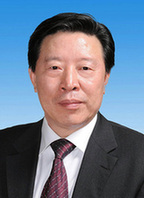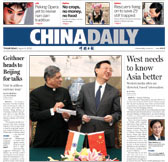

|
 Sun Jiazheng |
World Expo 2010 Shanghai China, a grand-scale global event, has adopted the significant theme "Better City, Better Life," which embodies the spirit of humanistic progress by embracing the concepts of "people first" and "scientific development."
Though it may lack the element of sports competition, World Expo is unparalleled in its own way as a window to the cultural diversity and the best innovative thinking in the world. It will foster a trans-global conversation on how we can improve the urban areas that stand at the forefront of human development and will play a key role in how we shape the material and spiritual progress of mankind. World expos have historically tracked the progress of civilization by showcasing what we have achieved and what we hope to achieve.
While presenting us with great convenience and enjoyment, cities have also created headaches. It is our challenge to address the question: How can we improve urban life? The whole world is hoping that the coming World Expo will help us answer that question to the lasting benefit of the entire human race.
A city is not the sum total of reinforced bars and concrete. Rather, it is an organic life form that keeps growing and changing. Its soul is the culture. China has promoted its urban development with its own characteristics.
One distinguishing feature, for example, is an emphasis on the farmers whose fields stretch beyond the skyscrapers and provide cities sustenance. Our urban development has attracted world attention with its people-oriented policies and its ideal of building a harmonious society.
The world is facing accelerating urbanization and modernization. It is imperative we manage those processes creatively. We must clearly define the world we want in the future and not lose sight of the values we deem important in the process of change. Providing a clearer understanding of these issues and proposing innovative ways of achieving our goals will be legacy that lives beyond World Expo itself.
World Expo 2010 Shanghai China has a formidable challenge ahead of it but can rise to meet it. The event will allow us to deepen our understanding, to strengthen our communication with other parts of the world and to express China's desire for international cooperation to the benefit of all nations.
New epoch of progress
Any nation that has made great strides and wants to keep progressing must maintain its enthusiasm for learning and the free exchange of ideas. Otherwise, it becomes too inward-looking, to its own detriment. There is a famous motto in the history of world expos: "Everything Starts with the World Expo."
In 1851, the first World Expo in London exhibited steam engines and the telegraph for the first time, ushering in a new epoch of progress. Since then, World Expos have been held more than 130 times in nearly 30 countries. Each exposition has proved a pioneer of its age in fields such as technology, culture, art and architecture. Each has been a driving force behind the exchange of ideas, an igniting fuse of wisdom and the start of a new round of learning, competition and progress.
As a top-level exhibition of global science, technology and culture, what wonders will World Expo 2010 Shanghai China bring us? Thanks to the rapid development of the media and the Internet, in particular, scientific and technological achievements now capture public attention even before their practical application. That may diminish somewhat the headline effect of scientific and technological innovations on display at World Expo, but it won't damp the awe of such a large body of knowledge and culture converging at one venue.
This World Expo is a golden opportunity for us to exhibit and promote ourselves. But we should not forget what brought us to this point. One of the fundamental reasons Deng Xiaoping chose to advocate economic reform and the opening-up of China to the world was the fact that decade-long social turmoil had bogged China down and isolated the nation from advances in the rest of world. Assessing the situation, he urged us to open our eyes and look outward so that we could see and face up to the gap that confronted us, so that we could develop an enthusiasm and determination to catch up with developed nations, so that we could waste no time in assimilating new knowledge for our own self-improvement.
By presenting us the world in miniature, the coming World Expo will broaden our vision, sharpen our minds and rekindle our enthusiasm. This is a great chance we cannot afford to miss. It is my hope that an increasing number of foreigners will come to realize that China, soon to become the world's second-largest economy after only 30 years of development, has remained cool-headed, open-minded, and ready to understand the world and learn from other countries. No one can easily dismiss such a nation.
For us Chinese, to see the World Expo is to see the world, while for many foreigners, to see World Expo is to see China. The demonstration of our spirit and character will not be limited to pavilions and exhibits. Instead, our essence of our nation will shine forth from our people.
Each of us, especially those who come to tour the Expo Park, becomes a calling card of China and an ambassador of the Chinese culture. "When you admire a landscape on a bridge, you are also part of the landscape for people on the tower," wrote Chinese poet Bian Zhilin.
Every Chinese visitor to the World Expo must think: "The world is looking at me while I am looking at it." We will greet our visitors with hospitality, friendliness, sincerity and open-mindedness. From every Chinese they meet, foreign visitors will experience the charms of the Chinese culture as a whole.


